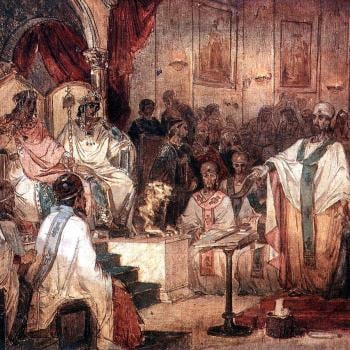Lectionary Reflections
1 Samuel 17:1a, 4-11, 19-23, 32-39
June 21, 2015
4th Sunday After Pentecost
Ask any person to name some story from the Bible, and you are liable to hear them say, David and Goliath. There are few upsets in sports or politics that do not engender a reference to this hallowed tale, wherein the tiny shepherd boy defeats the monstrous Philistine giant, much to the surprise and joy of the beleaguered Israelites and the shock and horror of the pagan Philistines. Well, the Israelites and Philistines may have been surprised at the outcome of the battle at Elah, but there is one person who was not in the least surprised, and that one was David himself. Let me show you what I mean, and hope thereby to demonstrate that the long cultural use of this story has been in the main quite misguided.
The context is clear enough. The forces of Saul's Israelites have come to the stream at the bottom of the valley of Elah presumably to fight with the Philistine army that has come to the same spot. But no fighting occurs at all, though the troops from both sides make a loud show of wishing to fight. All thought of combat is washed away with the coming of the enormous Philistine champion, Goliath, whom the teller claims to be "six cubits and a span" in height, nearly ten feet in modern measurement. (As an aside, the Greek translation of the text, the Septuagint, made perhaps in the 3rd century B.C.E., plainly does not believe this fantastic figure, changing it to "four cubits and a span," tall but within some reason.) The towering Goliath is also said to be wearing a bronze helmet, a huge chain-mail coat weighing some 5000 shekels of bronze (250 pounds?), and has a demonic javelin slung between his shoulder blades, whose spear head weighs 600 shekels of iron (20 pounds?). The shaft of this weapon is said to be the size of a weaver's beam, some five inches in diameter (1 Sam. 17:4-7). This detailed description constitutes the single longest human depiction in the entire Bible! And it will play a crucial role, as we shall see.
Goliath stands near the stream on the Philistine side and roars a challenge to the Israelites. "Why have you come out to draw up for battle? Am I not a Philistine, and are you not slaves of Saul? Choose a man for yourselves (if you can find a man among you!), and let him come down here to me. If he is able to fight with me and kill me (fat chance!), then we will be your slaves. If I prevail against him and kill him (which I am certain to do!), then you shall be our slaves and serve us" (1 Sam. 17: 8-9)! Goliath calls for the ancient code of single combat, thus avoiding the slaughter of many that always is the result of ancient battles. "Mano a mano," he shouts, but at the sound of his voice, every Israelite warrior runs headlong for his tent, hoping that he will not be chosen to suffer ignominious and certain death at the hands of the monster who calls. Even the mighty Saul, tallest man in Israel, wants no part of this fight.
Goliath stands in the river forty days, and each day speaks the same speech (1 Sam. 17:16), the implication being that perhaps the power of his brain does not quite match the power of his body. The speech is uttered eighty times, and the result is the same, Israelite fear and Philistine laughter. But on time #81, something different happens. David, the youngest son of Jesse, and the shepherd of his flocks of sheep, has been sent by his father to bring food to the battle site, and to see if his three eldest sons are well. As David went to greet his brothers, Goliath, as usual, came to the stream and shouted his demand for a fight. But this time, "David heard him" (1 Sam. 17:23). But not only has he heard Goliath, he also obviously sees him and marks his appearance very carefully. Immediately, upon hearing and seeing the giant, David turns to the terrified soldiers and asks them what one will get if he confronts and defeats the giant (1 Sam. 17:25). He is told that the winner will become rich, will marry one of the king's comely daughters, and will receive a tax-free life in the land along with his entire family. David asks the question again and again, with the intent of informing Saul that he, David, is prepared to fight Goliath.
The report of this upstart shepherd's ambition reaches the ears of the king, who summons the boy into the royal tent. When David enters Saul's tent, he does not greet the king with the usual words that any commoner would utter in the presence of royalty, but quickly begins, "Let no one's heart fail because of him; I will go and fight with the Philistine!" Not only is David's speech demeaning to Saul and his troops, all of whose hearts have certainly failed them, but his offer to combat the giant is absurd. David is a boy, without obvious fighting skill, while Goliath is immense and a hardened fighter to boot.
Saul states the obvious and refuses to allow the boy to go to his slaughter. But in response David makes up an egregiously lying tale about his prowess with wild beasts. "Your servant used to keep sheep for his father (note that in David's mind he has seen his last sheep!), and whenever a lion or a bear came, and took a lamb from the flock, I went after it and struck it down, rescuing the lamb from its mouth; and if it turned against me, I would catch it by the jaw, strike it down and kill it" (1 Sam. 17:34-35). Indeed! The shepherd would snatch lambs from the very jaws of lions and would grab a bear by its huge jaws and kill it with one well-placed blow? Absurd on its face! But a speech designed to convince a desperate king that he can dispatch the giant since he is no more than another beast of the wilderness. But I also suggest that it is a speech designed by one who knows for certain that he can in fact kill the giant.





